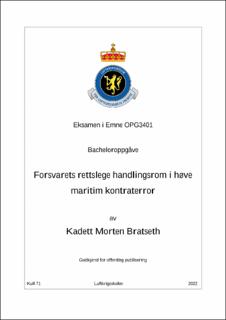| dc.description.abstract | Samandrag
For ein liten stat som Noreg bør og må Forsvaret og politiet samarbeida for å løysa visse oppdrag. Døme på eit slikt oppdrag er maritim kontraterror (MKT). Dette samarbeidet kan reise fleire rettslege spørsmål. Denne oppgåva analyserer, gjennom tre forskjellige scenarioar, Forsvaret sitt rettslege handlingsrom i høve til maritim kontraterror. Det første scenarioet omhandlar korleis MKT er skissert å løysast, det andre omhandlar korleis naudrett og naudvergerett kan gjere seg gjeldande, og det tredje omhandlar forholdet mellom politiet og Forsvaret i ei gråsone mellom terrorangrep og angrep på Noreg. Oppgåva nyttar juridisk metode. Funna i oppgåva viser at Forsvaret har relativt stort rettsleg handlingsrom i høve MKT. På trass av kva som er lov, er det ikkje gitt at det er like lurt å nytta handlingsrommet fullt ut.
Abstract
In a small state such as Norway, cooperation between the Norwegian Armed Forces and the police in particular missions can be expedient. One example of a mission where joining forces would be beneficial is Maritime Counter Terrorism. This cooperation could raise several legal questions, and this thesis analyses the legal scope of the Norwegian Armed Forces when fighting maritime terrorism by examining three scenarios. The first scenario deals with the Norwegian Government’s outlined course of action for Maritime Counter Terrorism. The second scenario deals with how the principle of necessity and self-defense may apply to such a mission. The third scenario focuses on the grey zone between terrorism and an armed attack on the state of Norway. This thesis thus uses a legal methodology. The findings suggest that the Norwegian Armed Forces have a broad legal scope within Maritime Counter Terrorism. Despite this, it is not necessarily wise to make full use of it. | en_US |
